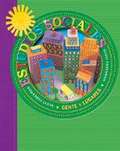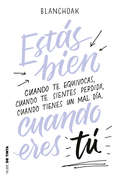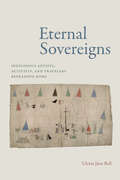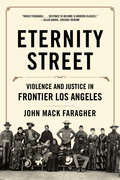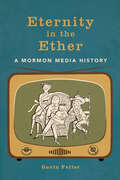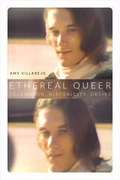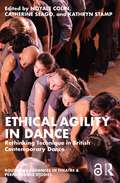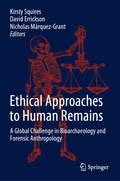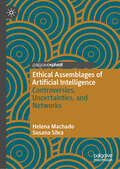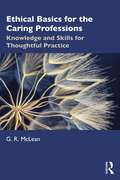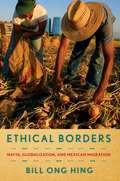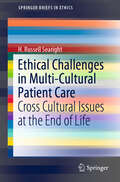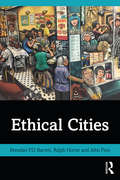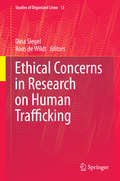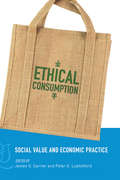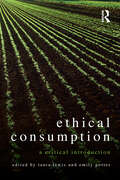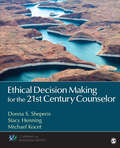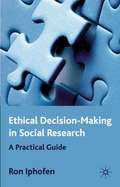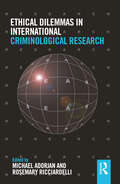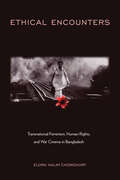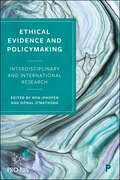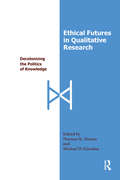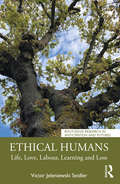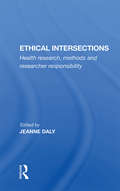- Table View
- List View
Estudios Sociales: Gente y Lugares
by Candy Dawson Boyd C. Frederick Risinger Geneva Gay Rita Geiger James B. Kracht Valerie Ooka Pang Sara Miranda SanchezA Spanish text book that teaches about Social Studies, people and places.
Estás bien cuando eres tú
by BlanchoakEl libro de @blanchoak, la cuenta de Instagram de inspiración y crecimiento personal. Voy a salir a la calle, y pienso comerme el mundo mejor de lo que lo hacía antes, voy a disfrutar todo lo que pueda y más. Pienso ponerme a cantar como una loca en medio de la calle, a bailar bajo la lluvia, a reírme a carcajada limpia y a lograr todo lo que quiero, y más. Solo estoy cogiendo carrerilla... ¿Estáis preparados? Ya salgo. El libro de @Blanchoak, el Instagram que inspira, anima y alegra el día de cientos de miles de seguidores cada día. Con textos inéditos que te llenarán de energía y de ideas para cumplir tus metas y, sobre todo, para ser todo lo feliz que mereces ser.
Eternal Sovereigns: Indigenous Artists, Activists, and Travelers Reframing Rome
by Gloria Jane BellIn 1925, Pius XI staged the Vatican Missionary Exposition in Rome’s Vatican City. Offering a narrative of the Catholic Church’s beneficence to a global congregation, the exposition displayed thousands of cultural belongings stolen from Indigenous communities, which were seen by one million pilgrims. Gloria Jane Bell’s Eternal Sovereigns offers critical revision to that story. Bell reveals the tenacity, mobility, and reception of Indigenous artists, travelers, and activists in 1920s Rome. Animating these conjunctures, the book foregrounds competing claims to sovereignty from Indigenous and papal perspectives. Bell deftly juxtaposes the “Indian Museum” of nineteenth-century sculptor Ferdinand Pettrich, acquired by the Vatican, with the oeuvre of Indigenous artist Edmonia Lewis. Focusing on Turtle Island, Bell analyzes Indigenous cultural belongings made by artists from nations including Cree, Lakota, Anishinaabe, Nipissing, Kanien’kehá:ka, Wolastoqiyik, and Kwakwaka’wakw. Drawing on years of archival research and field interviews, Bell provides insight into the Catholic Church’s colonial collecting and its ongoing ethnological display practices. Written in a voice that questions the academy’s staid conventions, the book reclaims Indigenous belongings and other stolen treasures that remain imprisoned in the stronghold of the Vatican Museums.
Eternity Street: Violence and Justice in Frontier Los Angeles
by John Mack Faragher“John Mack Faragher is one fine writer, bringing early L.A. to life as the setting for all manner of horrific killings and gruesome justice. Eternity Street will keep you up at night ruminating on the roots of American violence.”—Richard Wightman Fox, University of Southern California, author of Lincoln’s Body: A Cultural History Eternity Street tells the story of a violent place in a violent time: the rise of Los Angeles from its origins as a small Mexican pueblo. In a masterful narrative, John Mack Faragher relates a dramatic history of conquest and ethnic suppression, of collective disorder and interpersonal conflict. Eternity Street recounts the struggle to achieve justice amid the turmoil of a loosely governed frontier, and it delivers a piercing look at the birth of this quintessentially American city. In the 1850s, the City of Angels was infamous as one of the most murderous societies in America. Saloons teemed with rowdy crowds of Indians and Californios, Mexicans and Americans. Men ambled down dusty streets, armed with Colt revolvers and Bowie knives. A closer look reveals characters acting in unexpected ways: a newspaper editor advocating lynch law in the name of racial justice; hundreds of Latinos massing to attack the county jail, determined to lynch a hooligan from Texas. Murder and mayhem in Edenic southern California. "There is no brighter sun…no country where nature is more lavish of her exuberant fullness," an Angeleno wrote in 1853. "And yet, with all our natural beauties and advantages, there is no country where human life is of so little account. Men hack one another to pieces with pistols and other cutlery as if God's image were of no more worth than the life of one of the two or three thousand ownerless dogs that prowl about our streets and make night hideous." This is L.A. noir in the act of becoming.
Eternity in the Ether: A Mormon Media History (The History of Media and Communication)
by Gavin FellerMass media and the Church of Jesus Christ of Latter-day Saints evolved alongside each other, and communications technology became a fundamental part of the Church’s institutions and communities. Gavin Feller investigates the impact of radio, television, and the internet on Mormonism and what it tells us about new media’s integration into American life. The Church wrestled with the promise of new media to help implement its vision of Zion. But it also had to contend with threat that media posed to the family and other important facets of the Latter-day Saint faith. Inevitably, media technologies forced the leadership and lay alike to reconsider organizational values and ethical commitments. As Feller shows, the conflicts they faced illuminate the fundamental forces of control and compromise that enmesh an emerging medium in American social and cultural life. Intriguing and original, Eternity in the Ether blends communications history with a religious perspective to examine the crossroads where mass media met Mormonism in the twentieth century.
Ethereal Queer: Television, Historicity, Desire
by Amy VillarejoIn Ethereal Queer, Amy Villarejo offers a historically engaged, theoretically sophisticated, and often personal account of how TV representations of queer life have changed as the medium has evolved since the 1950s. Challenging the widespread view that LGBT characters did not make a sustained appearance on television until the 1980s, she draws on innovative readings of TV shows and network archives to reveal queer television's lengthy, rich, and varied history. Villarejo goes beyond concerns about representational accuracy. She tracks how changing depictions of queer life, in programs from Our Miss Brooks to The L Word, relate to transformations in business models and technologies, including modes of delivery and reception such as cable, digital video recording, and online streaming. In so doing, she provides a bold new way to understand the history of television.
Ethical Agility in Dance: Rethinking Technique in British Contemporary Dance (Routledge Advances in Theatre & Performance Studies)
by Noyale Colin Catherine Seago Kathryn StampThis edited collection examines the potential of dance training for developing socially engaged individuals capable of forging ethical human relations for an ever-changing world and in turn frames dance as a fundamental part of human experience. This volume draws together a range of critical voices to reflect the inclusive potential of dance. The contributions offer perspectives on contemporary dance training in Britain from dance educators, scholars, practitioners and artists. Through examining the politics, values and ethics of learning dance today, this book argues for the need of a re-assessment of the evolving practices in dance training and techniques. Key questions address how the concept of ‘technique’ and associated systems of training in dance could be redefined to enable the collaboration of skills and application of ideas necessary to twenty-first-century dance. The editors present these ideas in different modes of writing. This collection of essays, conversations and manifestos offers a way to explore, debate and grasp the shifting values of contemporary dance. Examining these values in the applied field of dance reveals a complex and contrasting range of ideas, encompassing broad themes including the relationships between individuality and collectivity, rigour and creativity, and virtuosity and inclusivity. This volume points to ethical techniques as providing a way of navigating these contrasting values in dance. It serves as an invaluable resource for academics as well as practitioners and students.
Ethical Approaches to Human Remains: A Global Challenge in Bioarchaeology and Forensic Anthropology
by Nicholas Márquez-Grant Kirsty Squires David ErricksonThis book is the first of its kind, combining international perspectives on the current ethical considerations and challenges facing bioarchaeologists in the recovery, analysis, curation, and display of human remains. It explores how museum curators, commercial practitioners, forensic anthropologists, and bioarchaeologists deal with ethical issues pertaining to human remains in traditional and digital settings around the world. The book not only raises key ethical questions concerning the study, display, and curation of skeletal remains that bioarchaeologists must face and overcome in different countries, but also explores how this global community can work together to increase awareness of similar and, indeed, disparate ethical considerations around the world and how they can be addressed in working practices. The key aspects addressed include ethics in bioarchaeology and forensic anthropology, the excavation, curation, and display of human remains, repatriation, and new imaging techniques. As such, the book offers an ideal guide for students and practitioners in the fields of bioarchaeology, osteoarchaeology, forensic anthropology, medical anthropology, archaeology, anatomy, museum and archive studies, and philosophy, detailing how some ethical dilemmas have been addressed and which future dilemmas need to be considered.
Ethical Assemblages of Artificial Intelligence: Controversies, Uncertainties, and Networks
by Helena Machado Susana SilvaThis book critically examines the ethical challenges of Artificial Intelligence (AI), focusing on facial recognition and AI-assisted reproductive technologies. It explores how these issues intertwine with social and political processes and power dynamics in digital societies. What defines ethical versus unethical in the realm of AI? Why do some ethical debates dominate, while others are overlooked? Which actors and institutions align or diverge in these discussions? To address these questions, the authors introduce the concept of "ethical assemblages," offering fresh perspectives on the complexities of AI ethics and their impact on socio-technoscientific structures.
Ethical Basics for the Caring Professions: Knowledge and Skills for Thoughtful Practice
by G. R. McLeanThis book trains students of the caring professions, across health and social care, in the basic philosophical skills and knowledge needed to deal with the ethical aspects of their profession. It shows why ethical education is required, and teaches the skills of reasoning that equip professionals to think critically about the theories and arguments used in ethical discussions. It demonstrates how we can be confident that we can rely on common moral ground; but it also points out how we need to recognise the influence of different world-views, and to note how, on some issues, these can lead us in starkly different directions. It explains relevant philosophical theories, and evaluates their strengths and weaknesses – particularly in relation to what is required for proper professional ethics. It shows how to employ the commonly accepted framework of four ethical principles – beneficence, non-maleficence, autonomy, and justice. These various matters are then illustrated in two extended case studies, which focus on the problem of euthanasia, and the question of screening for disability and the value of human life. Ethical Basics for the Caring Professions is designed for use on all health and social care and human services courses on ethics and values. It will also be of interest to academics and professionals working within these fields.
Ethical Borders: NAFTA, Globalization, and Mexican Migration
by Bill Ong HingIn his topical new book,Ethical Borders,Bill Ong Hing asks, why do undocumented immigrants from Mexico continue to enter the United States and, what would discourage this surreptitious traffic? An expert on immigration law and policy, Hing examines the relationship between NAFTA, globalization, and undocumented migration, and he considers the policy options for controlling immigration. He develops an ethical rationale for opening up the U. S. /Mexican border, as well as improving conditions in Mexico so that its citizens would have little incentive to migrate. InEthical BordersHing insists that reforming NAFTA is vital to ameliorating much of the poverty that drives undocumented immigration and he points to the European Union's immigration and economic development policies as a model for North America. Hing considers the world-wide economic crisis and the social problems that attend labor migration into homogenous countries, arguing for a spectrum of changes, including stricter border enforcement and more effective barriers; a path to citizenship for undocumented migrants; or a guest worker program. Hing also situates NAFTA and its effects in the larger, and rapidly shifting, context of globalization-particularly the recent rise of China as the world's economic giant. Showing how NAFTA's unforeseen consequences have been detrimental to Mexico, Hing passionately argues that the United States is ethically bound to address the problems in a way that puts prosperity within the grasp of all North Americans.
Ethical Challenges in Multi-Cultural Patient Care: Cross Cultural Issues at the End of Life (SpringerBriefs in Ethics)
by H. Russell SearightThis book provides an up-to-date description of cross-cultural aspects of end-of-life decision-making. The work places this discussion in the context of developments in the United States such as the emphasis on patient informed consent, “right to die” legal cases, and the federal Patient Self-Determination Act. With the globalization of health care and increased immigration from developing to developed countries, health care professionals are experiencing unique challenges in communicating with seriously ill patients and their families about treatment options as well as counselling all patients about advance medical care planning. While many Western countries emphasize individual autonomy and patient-centered decision-making, cultures with a greater collectivist orientation have, historically, often protected patients from negative health information and emphasized family-centered decision-making. In order to place these issues in context, the history of informed consent in medicine is reviewed. Additionally, cross-cultural issues in health care decision-making are analysed from the perspective of multiple philosophical theories including deontology, utilitarianism, virtues, principlism, and communitarian ethics. This book is a valuable addition to courses on end-of-life care, death and dying, cross-cultural health, medical anthropology, and medical ethics and an indispensable guide for healthcare workers dealing with patients coming from various cultural backgrounds.
Ethical Cities
by Ralph Horne John Fien Brendan F.D. BarrettCombining elements of sustainable and resilient cities agendas, together with those from social justice studies, and incorporating concerns about good governance, transparency and accountability, the book presents a coherent conceptual framework for the ethical city, in which to embed existing and new activities within cities so as to guide local action. The authors’ observations are derived from city-specific surveys and urban case studies. These reveal how progressive cities are promoting a diverse range of ethically informed approaches to urbanism, such as community wealth building, basic income initiatives, participatory budgeting and citizen assemblies. The text argues that the ethical city is a logical next step for critical urbanism in the era of late capitalism, characterised by divisive politics, burgeoning inequality, widespread technology-induced disruptions to every aspect of modern life and existential threats posed by climate change, sustainability imperatives and pandemics. Engaging with their communities in meaningful ways and promoting positive transformative change, ethical cities are well placed to deliver liveable and sustainable places for all, rather than only for wealthy elites. Likewise, the aftermath of shocks such as the 2008 Global Financial Crisis and the Covid-19 pandemic reveals that cities that are not purposeful in addressing inequalities, social problems, unsustainability and corruption face deepening difficulties. Readers from across physical and social sciences, humanities and arts, as well as across policy, business and civil society, will find that the application of ethical principles is key to the pursuit of socially inclusive urban futures and the potential for cities and their communities to emerge from or, at least, ameliorate a diverse range of local, national and global challenges.
Ethical Concerns in Research on Human Trafficking
by Dina Siegel Roos De WildtThis book presents a vivid description of the solutions that researchers have discovered for ethical dilemmas that pose themselves at studying disadvantaged, vulnerable and victimized populations. Ethical codes prescribe that the scholar should in all circumstances avoid potential harm, that informed consent is necessary and that the limits of confidentiality should always be respected. However, in the practice of research among women involved in prostitution, illegal immigrant workers, enslaved children, people who sell their organs and all the traffickers thereof, the ethical rules cannot always be followed. This book shows that there is a surprising variety of arguable possibilities in dealing with ethical dilemmas in the field. Authors reflect on concrete experiences from their own fieldwork in a wide variety of settings such as the USA, Singapore, Kosovo and The Netherlands. Some choose to work on the basis of conscientious partiality, others negotiate the rules with their informants and still others purposely break the rules in order to disclose and damage the exploiters. Researchers may find themselves in a vulnerable position. Their experiences, as presented in this volume, will help field workers, university administrators, representatives of vulnerable groups, philosophers of ethics and most of all students to go into the field well-prepared. This is a book that every researcher planning to do fieldwork in the difficult field of hidden, illicit and victimized people should read in advance. Dr. Frank Bovenkerk, Professor (Emeritus), Willem Pompe Institute for Criminal Law and Criminology, Universiteit Utrecht, The Netherlands This book allows a peek in the kitchen of empirical fieldwork, going into not only "best practices," but mistakes made, in a frank, courageous and honest way. Dr. Brenda C. Oude Breuil, Willem Pompe Institute for Criminal Law and Criminology, Universiteit Utrecht, The Netherlands
Ethical Consumption
by Peter G. Luetchford James G. CarrierIncreasingly, consumers in North America and Europe see their purchasing as a way to express to the commercial world their concerns about trade justice, the environment and similar issues. This ethical consumption has attracted growing attention in the press and among academics. Extending beyond the growing body of scholarly work on the topic in several ways, this volume focuses primarily on consumers rather than producers and commodity chains. It presents cases from a variety of European countries and is concerned with a wide range of objects and types of ethical consumption, not simply the usual tropical foodstuffs, trade justice and the system of fair trade. Contributors situate ethical consumption within different contexts, from common Western assumptions about economy and society, to the operation of ethical-consumption commerce, to the ways that people's ethical consumption can affect and be affected by their social situation. By locating consumers and their practices in the social and economic contexts in which they exist and that their ethical consumption affects, this volume presents a compelling interrogation of the rhetoric and assumptions of ethical consumption.
Ethical Consumption: A Critical Introduction (Media, Culture And Social Change In Asia Ser.)
by Emily Potter Tania LewisA not-so-quiet revolution seems to be occurring in wealthy capitalist societies - supermarkets selling ‘guilt free’ Fairtrade products; lifestyle TV gurus exhorting us to eat less, buy local and go green; neighbourhood action groups bent on ‘swopping not shopping’. And this is happening not at the margins of society but at its heart, in the shopping centres and homes of ordinary people. Today we are seeing a mainstreaming of ethical concerns around consumption that reflects an increasing anxiety with - and accompanying sense of responsibility for - the risks and excesses of contemporary lifestyles in the ‘global north’. This collection of essays provides a range of critical tools for understanding the turn towards responsible or conscience consumption and, in the process, interrogates the notion that we can shop our way to a more ethical, sustainable future. Written by leading international scholars from a variety of disciplinary backgrounds - and drawing upon examples from across the globe - Ethical Consumption makes a major contribution to the still fledgling field of ethical consumption studies. This collection is a must-read for anyone interested in the relationship between consumer culture and contemporary social life.
Ethical Decision Making for the 21st Century Counselor (Counseling and Professional Identity)
by Stacy L. Henning Michael M. Kocet Donna S. SheperisEthical practice is an essential aspect of counselor training. In order for counselors to competently work with clients, they must be well versed in ethical codes, ethical decision making, and legal issues impacting the profession. Ethical Decision Making for the 21st Century Counselor provides the fundamentals of ethical practice, with emphasis on ethical decision making and is structured to facilitate the development of these skills and understanding and applying them. Individuals will be able to incorporate ethical practice into their understanding of the counseling process and integrate ethical decision making models into their counseling practice. This unique approach differs from existing texts because of its strong emphasis on practical decision making and focus on understanding the process of applying a standard ethical decision model to any ethical scenario. Students build a foundation in how to evaluate an ethical situation and feel confident that they have applied a set of decision models to reach the best decision. Ethical Decision Making for the 21st Century Counselor is part of the SAGE Counseling and Professional Identity Series, which targets specific competencies identified by CACREP (Council for Accreditation of Counseling and Related Programs).
Ethical Decision Making for the 21st Century Counselor (Counseling and Professional Identity)
by Stacy L. Henning Michael M. Kocet Donna S. SheperisEthical practice is an essential aspect of counselor training. In order for counselors to competently work with clients, they must be well versed in ethical codes, ethical decision making, and legal issues impacting the profession. Ethical Decision Making for the 21st Century Counselor provides the fundamentals of ethical practice, with emphasis on ethical decision making and is structured to facilitate the development of these skills and understanding and applying them. Individuals will be able to incorporate ethical practice into their understanding of the counseling process and integrate ethical decision making models into their counseling practice. This unique approach differs from existing texts because of its strong emphasis on practical decision making and focus on understanding the process of applying a standard ethical decision model to any ethical scenario. Students build a foundation in how to evaluate an ethical situation and feel confident that they have applied a set of decision models to reach the best decision. Ethical Decision Making for the 21st Century Counselor is part of the SAGE Counseling and Professional Identity Series, which targets specific competencies identified by CACREP (Council for Accreditation of Counseling and Related Programs).
Ethical Decision-Making in Social Research
by Ron IphofenThis practical, user-friendlyguide examines ethics in research. Ithelpsresearchers to manageethical dilemmas that arise while research is being planned, conducted and reported and includes a unique 'ethical review checklist' and 'risk matrix', as well as other useful features, to aid ethics in practice. "
Ethical Dilemmas in International Criminological Research (Routledge Advances in Criminology)
by Michael Adorjan Rosemary RicciardelliBuilding on the editors’ previous publication, Engaging with Ethics in International Criminological Research, this new book brings together a fresh collection of leading international scholars tackling ethical dilemmas in criminological research. Contributors address how they have experienced and addressed ethical issues in their research, and how they have balanced the benefits and harms of doing such research for both the researcher and the researched. Ethical Dilemmas in International Criminological Research draws on various issues across a range of jurisdictions and political and social contexts, including cybercrime and transgressive online actions; state and police responses to crime; the war on drugs; working with traumatised participants in criminological research; punishment and prison; and sex, sexualities, and gender. Moreover, this collection aims to offer a truly international perspective, including insights from research projects in the Global South. This book is essential reading for junior scholars just starting out with original research, as well as more seasoned researchers looking to gain insights into the challenges of criminological research in other cultural contexts. It is also instructive reading for students taking courses in criminological and social research methods.
Ethical Encounters: Transnational Feminism, Human Rights, and War Cinema in Bangladesh
by Elora Halim ChowdhuryEthical Encounters is an exploration of the intersection of feminism, human rights, and memory to illuminate how visual practices of recollecting violent legacies in Bangladeshi cinema can conjure a global cinematic imagination for the advancement of humanity. By examining contemporary, women-centered Muktijuddho cinema—features and documentaries that focus on the Bangladesh Liberation War of 1971—Elora Chowdhury shows how these films imagine, disrupt, and reinscribe a gendered nationalist landscape of trauma, freedom, and agency. Chowdhury analyzes Bangladeshi feminist films including Meherjaan, and Itihaash Konna (Daughters of History), as well as socially-engaged films by activist-filmmakers including Jonmo Shathi (Born Together), and Shadhinota (A Certain Liberation), to show how war films of Bangladesh can generate possibilities for gender justice. Chowdhury argues that justice-driven films are critical to understanding and negotiating the layered meanings and consequences of catastrophic human suffering yet at the same time they hint at subjectivities and identities that are not reducible to the politics of suffering. Rather, they are key to creating an alternative and disruptive archive of feminist knowledge—a sensitive witnessing, responsible spectatorship, and just responsibility across time, and space. Drawing on Black and transnational feminist critiques, Chowdhury explores questions around women’s place, social roles, and modes of participation in war as well as the visual language through which they become legible as victims/subjects of violence and agents of the nation. Ethical Encounters illuminates the possibilities of film as a site to articulate an ethics that acknowledges a founding violence of the birth of a nation, recuperates it even if in fragments, and imagines differently the irreconcilable relationship between humanity, liberty, and justice.
Ethical Evidence and Policymaking: Interdisciplinary and International Research
by Ron Iphofen and Dónal O’MathúnaEPDF and EPUB available Open Access under CC-BY-NC-ND licence. This important book offers practical advice for using evidence and research in policymaking. The book has two aims. First, it builds a case for ethics and global values in research and knowledge exchange, and second, it examines specific policy areas and how evidence can guide practice. The book covers important policy areas including the GM debate, the environment, Black Lives Matter and COVID-19. Each chapter assesses the ethical challenges, the status of evidence in explaining or describing the issue and possible solutions to the problem. The book will enable policymakers and their advisors to seek evidence for their decisions from research that has been conducted ethically and with integrity.
Ethical Futures in Qualitative Research: Decolonizing the Politics of Knowledge (International Congress of Qualitative Inquiry Series)
by Norman K. Denzin Michael D. GiardinaEthics has been a perennial concern of qualitative researchers. The subject has been confounded with the emergence of human subjects regulations, the increased concern with indigenous communities, the globalization of research practices, and the breakdown of barriers between researcher and subject. The original contributions to this volume highlight the key topics that face contemporary qualitative researchers and those that will likely emerge in the near future. Written by many of the leading figures in the field—Lincoln, Denzin, Schwandt, Richardson, Ellis, Bochner, Morse, among others—this book will help shape the ethical response of the field to the challenges presented by the contemporary research environment.
Ethical Humans: Life, Love, Labour, Learning and Loss (Routledge Research in Anticipation and Futures)
by Victor Jeleniewski SeidlerEthical Humans questions how philosophy and social theory can help us to engage the everyday moral realities of living, working, loving, learning and dying in new capitalism. It introduces sociology as an art of living and as a formative tradition of embodied radical eco post-humanism. Seeking to embody traditions of philosophy and social theory in everyday ethics, this book validates emotions and feelings as sources of knowledge and shows how the denigration of women has gone hand in hand with the denigration of nature. It queries post-structuralist traditions of anti-humanism that, for all their insights into the fragmentation of identities, often sustain a distinction between nature and culture. The author argues that in a crisis of global warming, we have to learn to listen to our bodies as part of nature and draws on Wittgenstein to shape embodied forms of philosophy and social theory that questions theologies that tacitly continue to shape philosophical traditions. In acknowledging our own vulnerabilities, we question the vision of the autonomous and independent rational self that often remains within the terms of dominant white masculinities. This book offers different modes of self-work, drawing on psychoanalysis and embodied post-analytic psychotherapies as part of a decolonising practice questioning Eurocentric colonising modernity. In doing so it challenges, with Simone Weil, Roman notions of power and greatness that have shaped visions of white supremacy and European colonial power and empire. This book will be of great interest to students and scholars of environmental ethics, environmental philosophy, social theory and sociology, ethics and philosophy, cultural studies, future studies, gender studies, post-colonial studies, Marxism, psychoanalysis and psychotherapy and philosophy and sociology as arts of living.
Ethical Intersections: Health Research, Methods And Researcher Responsibility
by Jeanne DalyThis book presents a collection of essays that aims to make public the social discourse on ethics of health research used by responsible, practising researchers in order to demonstrate the detailed and fine consideration given to the ethics of the research task.
